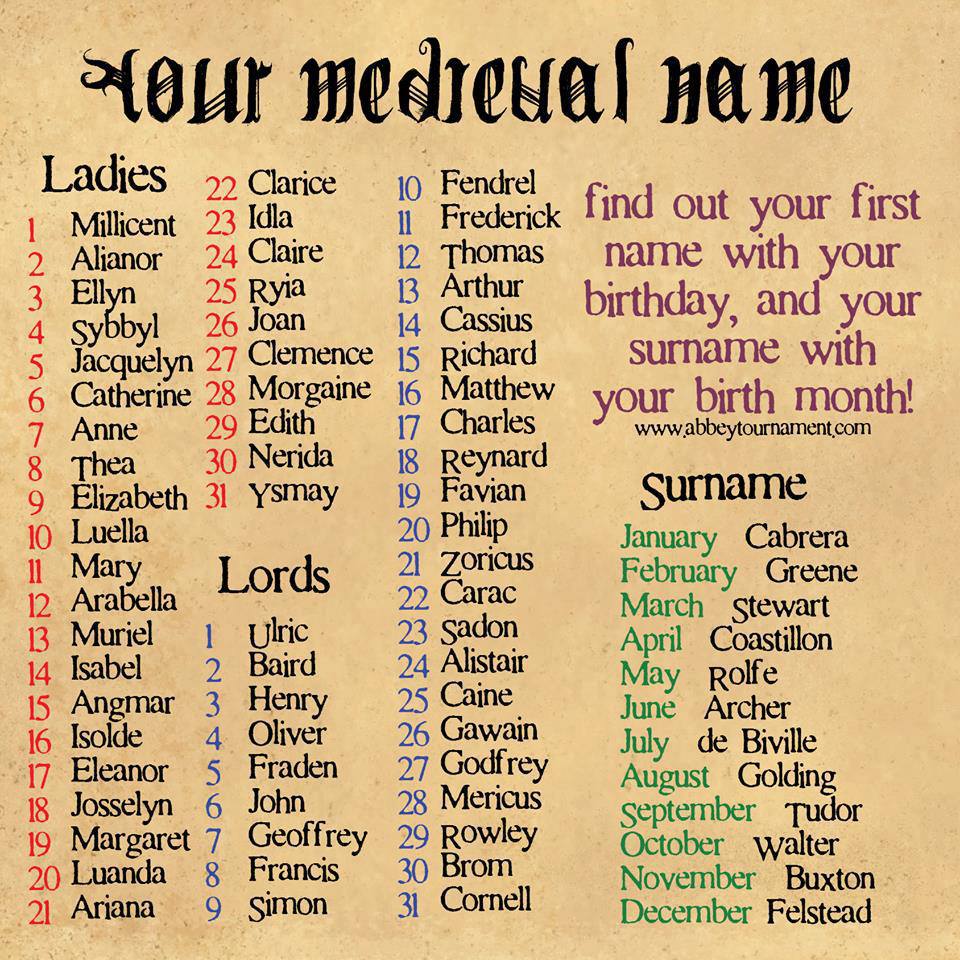Medieval last names serve as a fascinating window into the past, revealing insights about lineage, occupation, and geographical origins. These names, often steeped in history, carry with them tales of nobility, trades, and the intricate societal structures that defined the medieval era. As families sought to establish their identities, last names became a crucial part of their heritage, reflecting not just who they were, but also their roles within their communities.
During the medieval period, the practice of surnaming began to solidify, transitioning from a simple identifier to a more complex system that indicated social status, profession, or even personal traits. These last names often evolved from a variety of sources, including first names, nicknames, geographic locations, and occupations. As such, they offer a glimpse into the daily lives and social hierarchies of medieval society.
As we delve deeper into the world of medieval last names, we will explore their origins, variations, and the stories behind them. From the noble houses of Europe to the common tradesmen of the time, understanding these surnames enriches our appreciation of history and the cultural heritage that shapes our modern identities.
What Are the Origins of Medieval Last Names?
Medieval last names often stem from various sources, including:
- Patronymic Names: Derived from the father's name, such as Johnson (son of John).
- Occupational Names: Indicating a person's trade, like Smith (blacksmith).
- Toponymic Names: Based on geographical locations, such as Hill or Rivers.
- Descriptive Names: Reflecting physical characteristics or traits, like Brown or Short.
How Did Social Status Influence Medieval Last Names?
Social status played a significant role in the formation of medieval last names. Nobility often adopted surnames that signified their lineage or land ownership, while commoners tended to have names that reflected their occupation or location. This distinction helped to reinforce the class system of the time, creating a clear hierarchy within society.
Can You Provide Examples of Notable Medieval Last Names?
Several medieval last names have persisted through generations and are still recognized today. Some examples include:
- Fitzgerald: Originating from the Anglo-Norman term meaning 'son of Gerald.'
- Beaumont: Meaning 'beautiful mountain,' often associated with noble families.
- Chaucer: Made famous by Geoffrey Chaucer, the name signifies 'shoemaker' in Old French.
- Percy: A name linked to an English noble family, known for their rich history and influence.
What Role Did Geography Play in Shaping Medieval Last Names?
Geographic influences are deeply embedded in many medieval last names. Individuals often derived their surnames from the regions or landmarks near where they lived. For instance, names like Woods, Rivers, and Hill indicate a person's connection to the natural landscape, while names like London or Paris reveal a direct association with specific towns or cities.
Are There Common Themes in Medieval Last Names?
Indeed, common themes can be identified within medieval last names, including:
- Occupation: Many names reflect trades, such as Baker, Fisher, or Weaver.
- Lineage: Names indicating descent, like Anderson (son of Andrew) or Johnson (son of John).
- Geographical Features: Many surnames were derived from landscapes, such as Moore or Brook.
- Attributes: Descriptive surnames that denote characteristics, like Strong or Wise.
What Are Some Unique Medieval Last Names and Their Meanings?
Some unique medieval last names and their meanings include:
- Thacker: A name given to someone who worked in a thatched house or roof.
- Hawkins: Derived from the diminutive of the name Hawke, meaning 'hawk.'
- Wainwright: Referring to a maker of wagons.
- Vaughan: Meaning 'small' or 'little,' derived from Welsh origins.
How Have Medieval Last Names Evolved Over Time?
The evolution of medieval last names can be traced through historical documents, showing how they have changed in spelling and form. Some names have been simplified, while others have been anglicized or adapted to different languages. This evolution reflects the migration of people and the blending of cultures over centuries.
What Is the Significance of Preserving Medieval Last Names Today?
Preserving medieval last names holds significant value for genealogists, historians, and cultural enthusiasts. By studying these names, we can gain insights into family histories, social structures, and cultural identities. Furthermore, maintaining this connection to our past enriches our understanding of modern society and the influences that have shaped it.
How Can One Research Their Medieval Last Name?
If you are interested in researching your medieval last name, consider the following steps:
- Start with Family Records: Gather information from family history, documents, and oral traditions.
- Consult Historical Sources: Utilize archives, libraries, and online databases to access historical records.
- Engage with Experts: Reach out to historians or genealogists who specialize in medieval studies.
- Participate in Forums: Join online communities dedicated to genealogy and surname research.
Conclusion: The Legacy of Medieval Last Names
Medieval last names are more than mere identifiers; they are a reflection of our history, culture, and the intricate tapestry of human society. Understanding these names allows us to connect with our ancestors and appreciate the profound impact of the past on our present. Whether through noble lineages or common trades, these surnames continue to resonate with meaning, reminding us of the diverse and rich heritage that shapes our world today.
Exploring The Life Of Karishma Kapoor's Husband
Unveiling The Connection: Rebecca Dyer And David Foster
Unveiling The Mystery Behind Jameliz Leaks


